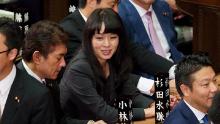
Shoko Arai, 51, was voted out on Sunday in Kusatsu, which is famous for its natural hot springs and resorts. The dismissal request claimed Arai's allegations had "degraded" the women of the Gunma prefecture town.
In total, 92% of votes lodged demanded her removal, according to Kusatsu officials.
The controversy began in November last year, when Arai published an e-book claiming she had been forced into a sexual relationship with the town's mayor, Tadanobu Kuroiwa.
A motion to fire the mayor was voted down, and Arai was expelled from the assembly a month later. However, the expulsion was appealed, and ultimately reversed by the prefecture.
After she was reinstated, a group of 19 residents led by council chairman Takashi Kuroiwa sent a dismissal request to the council, prompting the residential referendum that unseated Arai last weekend.
The dismissal request also claimed that Arai's statements to media about the assault allegations had hurt Kusatsu's reputation. It pointed to several specific remarks Arai had made, including ones that town women were "treated as objects," and that women often became mistresses to powerful male resort owners to gain privileges.
The request pointed out that the mayor had denied the allegations, and Arai's salary as a council member was a "waste" of taxpayer money.
In an official response to the council, Arai said the mayor and other council members calling for her removal were the ones damaging the town's dignity and reputation.
Her ousting on Sunday has pushed the resort town into the national spotlight. Since the weekend, the town hall has received dozens of calls criticizing Arai's dismissal, mostly coming from outside the town, said Kusatsu official Kenji Hagiwara. Many callers called the decision unfair and sexist.
"This is an unprecedented situation," Hagiwara told CNN. "We worry the image of this town is damaged."
Sexism and power in Japan
The gap widens further in politics. As of October this year, 46 of 465 lower house lawmakers in Japan were women. That's fewer than 10%, compared to a 25% global average.
But seven years on, the campaign has had limited success, with gender discrimination and inequality still rife. The #MeToo movement led to concrete progress in other countries and a shift in cultural conversation -- but it was met with resistance in Japan.
In a case that gained international attention in 2017, freelance journalist Shiori Ito alleged a high-profile journalist had invited her to dinner two years prior, and then raped her.
The response was far from supportive -- she received threats, backlash on social media, and even fled Japan, fearing for her and her family's safety. Even authorities tried to discourage her from pursuing legal action, she said.
The win was celebrated by her supporters as a step toward justice -- but "a win doesn't wipe away everything that happened," she told reporters after the ruling. "I need to face my emotional scars from now. This is not the end."
Correction: This story has been updated to reflect that Tadanobu Kuroiwa is the mayor of Kusatsu, and Takashi Kuroiwa is council chairman.
CNN's Emiko Jozuka contributed to this report.









 Add Category
Add Category
